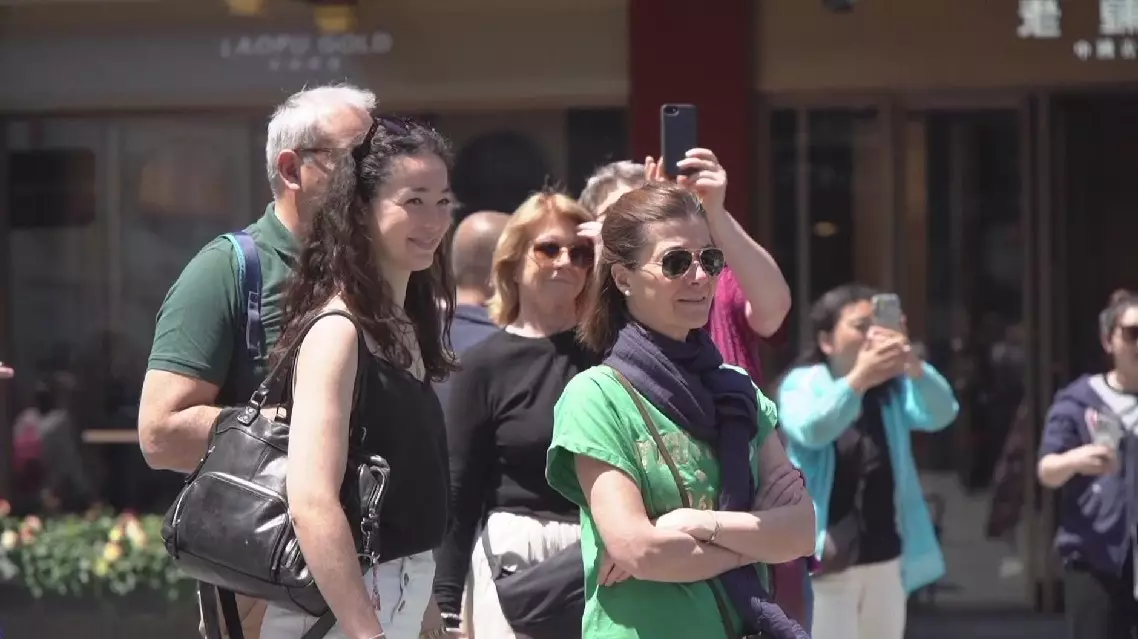Foreign tourists are flocking to different attractions across China, thanks to a series of favorable visa policies launched before, contributing to the robust growth of inbound tourism.
Poland is one of the first countries on the list of nations whose nationals are currently eligible for China's 144-hour visa-free policy, which allows foreign tourists to visit China for six days without a visa.
As a China fan, Polish tourist Gosia has been to China many times before, but the opening measures has still rekindled her enthusiasm this year.
"I think there is so much to explore in China. Wherever, whenever you go to different city in China, people are completely different, as an example, they have even different culture, they have different foods. It's very interesting for us to immerse in ancient Chinese culture," she said.
Beyond the 144-hour visa free policy, China has also introduced a 15-day option for an increasing number of countries. Many cities in China have launched tourist services that are available before and after entry, including accommodation, car rentals and ticket purchases.
According to Ludovic Rouzel, a French tourist, obtaining visas was quite troublesome when he and his wife visited China a year ago. Now, however, the situation is completely different.
"Now for my son and my daughter visiting us for 14 days, it is very easy. They just say, we are tourists, check the passport, everything, fill the form, and you get the stamp, it's that easy. It is a good initiative for the Chinese government to allow in not only French, but many other foreign countries. It makes things definitely easier for us," he added.
Since the start of 2024, China has seen a continuous surge in inbound tourism.
Nationwide, the first seven months of the year saw 17.25 million foreign visitors entering China through various ports, an increase of 129.9 percent compared to the same period last year. Additionally, a total of 846,000 port visas were issued, up 182.9 percent year on year.

China's favorable visa-free policies attract flocks of foreign tourists
Many Singaporeans support raising the re-employment age, partly to stay busy and active in retirement, and to help address demographic challenges in the workforce.
Like many other Asian countries, Singapore is grappling with a rapidly aging population. The government predicts that by 2030, one in four Singaporeans will be aged 65 or older, up from one in 10 two decades ago.
A survey on retirement and employment conducted last year in the country found broad support for raising the national retirement age, with about 88 percent of those aged 50 and above in favor.
Some supported increasing the retirement age because continuing to do what they love, rather than retiring, keeps them feeling youthful and fulfilled.
When Nancy Hor, a retired IT operations manager, left her job five years ago, she wasn't sure how to fill her time.
"I'm a workaholic. At the very first stage after I retired, I felt I could not find balance," she said.
Hor, now 70, said it took her some time to adjust. In her spare time, she stays busy line dancing and spending time with her family.
But she said that if she had had the choice, she would have liked to stay employed a little longer.
"I think it's good for the elderly that even they have some job to do, and keep them busy," said Hor.
In March, authorities announced plans to raise the retirement age to 64 and the re-employment age to 69 by 2026.
Singapore's Minister of State for Manpower, Gan Siow Huang, said the changes to the rules protect senior workers from dismissal due to age-related issues before they reach the statutory retirement age. Employers are also required to offer re-employment to eligible workers until they reach the statutory re-employment age limit.
This follows a similar move made two years ago to raise the retirement and re-employment ages to 63 and 68, respectively. The city-state is also aiming for a retirement age of 65 and a re-employment age of 70 by 2030.
"That is to reduce the impact on businesses, so it gives time for businesses to adapt their policy. This gradual increase in retirement age basically provides a framework for individuals like myself, who want to continue to be gainfully employed," said Patrick Chang, a retirement planning specialist and the author of the A to Z guide to retirement planning.
Chang said that businesses will need to make adjustments to accommodate the changes, including offering retraining for senior workers.
He noted that the changes won't impact those who still wish to retire earlier, but given Singapore's demographic challenges, the country cannot afford to remain idle.
"If we don't do it now, the social cost could be high. We cannot wait until the time when we need it today, and then we get something done. It will probably be a bit too late, and the cost of getting to that solution will be higher," said Chang.

Many Singaporeans support raising retirement, re-employment ages










